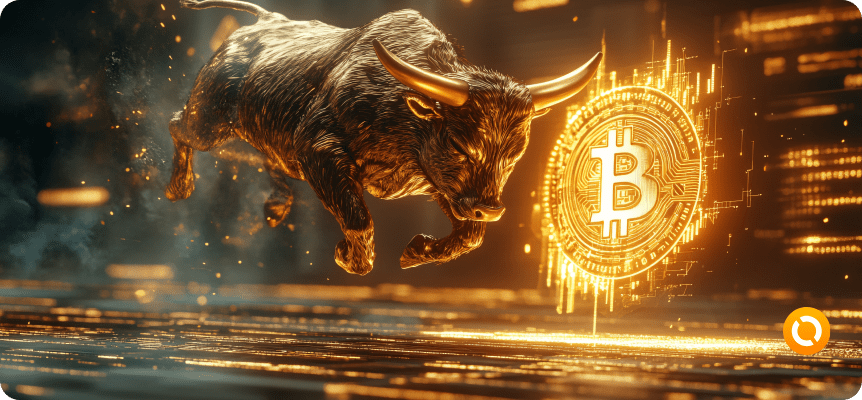But in order not to get lost in a sea of complex words, abbreviations and specific slang, it is important to understand the fundamental concepts and terminology of the crypto industry.
Whether you are just starting your acquaintance with the world of cryptocurrencies or want to deepen your knowledge, this dictionary is your indispensable assistant.
In it, we have collected all the key terms and concepts that will help you confidently navigate the market, make informed decisions and avoid typical mistakes of beginners.
In this article, we will explain everything in simple terms, without complex technical formulations, so that everyone can quickly and easily understand the crypto world.
Ready to embark on a journey through key concepts that will open the doors to the digital future of finance? Let’s get started!
Cryptocurrency
Digital or virtual money issued and stored electronically. It has no physical existence and operates outside the control of any government thanks to decentralized ledger technology called blockchain.
- Bitcoin (BTC) is the first cryptocurrency, “digital gold”. It serves as a store of value and a reserve currency of the market
- Altcoins are all coins other than Bitcoin: Ethereum (ETH), Litecoin (LTC), etc. They are called “alternatives” and offer new features, technologies, or niche applications.
Tokens
Digital assets based on blockchain (most often Ethereum). They are not always money, but can represent rights, shares, utilities:
- Utility-token — provides access to services (for example, GAS or Appcoins)
- Security tokens are similar to shares and provide a share of profits or voting rights.
- NFT (Non-Fungible Token) are unique digital objects, where each token is different from the others
Blockchain and key concepts
- A block is a packet of transactions linked to the previous one, forming a chain.
- Blockchain (distributed registry) is a decentralized immutable database synchronized between multiple participants
- Consensus (Proof of Work, Proof of Stake) is a mechanism by which the network reaches a consensus by confirming transactions.
- Validator / Forging / Staking — network participants who validate transactions and receive rewards. In PoS, they “forge” a new block, and token holders can earn income through staking
- Mining (Proof of Work) – miners use computing power to verify blocks and receive a reward.
Network parameters
- Gas, Gas Price, Gwei — fee for performing operations in Ethereum; measured in “gas”, payment in gwei.
- Nonce is a unique number required to confirm a block or transaction.
- Block time — average time to create a block.
Miscellaneous
- Stablecoin is a cryptocurrency with fixed rates, stabilized by fiat, assets or algorithmically
- Fiat : USDT, USDC – backed by currencies.
- Commodity : auxiliary assets (gold, etc.).
- Algorithmic : independently regulate supply.
- ICO / Pre-ICO — initial token offering; Pre-ICO — stage before the main launch
Investor and trader tools
- Exchange is a platform for buying, selling and exchanging cryptocurrencies
- Market Order and Limit Order – market and limit orders to regulate buying/selling.
- Liquidity / Market Maker / Market Taker – supply liquidity / add liquidity / accept offers.
Market Slang and Dynamics
- ATH / ATL — historical maximum/minimum price of an asset.
- Bull / Bear market – bullish (growth) and bearish (fall) markets.
- HODL — “Hold On for Dear Life” — a strategy of holding an asset despite fluctuations
- FOMO — “Fear Of Missing Out” — fear of missing out on growth, leads to impulsive decisions
- Moon – when the price rises rapidly, “flies to the moon”.
- Degen — risky traders, “playing” on meme-coins and altcoins
- Meme‑coin (memcoin) – entertainment tokens, often without real value, like Dogecoin
- Rug Pull is a scam: creators take your money and disappear.
Advanced Topics
- Smart Contract – a self-executing contract written in the blockchain code
- DeFi (decentralized finance) — financial services without intermediaries: loans, credits, swaps
- TVL (Total Value Locked) — the total amount of funds locked in DeFi protocols
- Bridge is a connection between different blockchains to transfer assets back and forth.
- Oracle is a source of external data (prices, events) for smart contracts.
- Layer-2, Sharding, EVM – technologies for scaling and increasing the efficiency of blockchain.
Safety and storage
- Wallet :
- Hot Wallet – online, convenient for trading, but risk of loss if hacked.
- Cold Wallet is an offline, secure storage method, especially hardware ones.
- Seed phrase / private key – primary access to funds, keep it safe!
- Non-custodial – you are the only one who holds the keys; Custodial – stored by the service.
Conclusion
Diving into the world of cryptocurrency is not just about learning a new technology, it’s about entering a revolutionary financial ecosystem that is changing the rules of the game. Knowing and understanding the terminology is your reliable compass in this dynamic space, helping you make informed decisions and effectively manage your investments.
Today, cryptocurrency is not only an opportunity to earn money, but also a tool for expanding financial freedom, access to new services, and participation in global innovations. But in order not to get lost in the flow of information, it is important to speak the same language as the market – to know key terms, understand their essence, and be able to apply knowledge in practice.
This dictionary is your base, the foundation for further growth and development. Continue to learn, explore and experiment, because the crypto world is open to those who are ready to move forward. The better armed you are with knowledge, the higher your chances of not just surviving, but achieving real success in the digital economy.
Remember: Every expert was once a beginner, and now is the best time to start. Use this dictionary to confidently step into a future full of opportunities and challenges.
Good luck on your crypto journey!
FAQ
💡 What is cryptocurrency in simple terms?
Cryptocurrency is a digital unit that is used to store and transfer value. It operates on blockchain technology, where transaction data is recorded and verified by thousands of computers called nodes . The main difference from traditional currencies is decentralization: data is not stored by one person or company , but is distributed among all participants in the network.
📲 How does cryptocurrency trading work?
Cryptocurrency trading takes place through special applications , exchanges and services that allow you to buy , sell and exchange digital assets. This can happen directly , using trading pairs, such as BTC / USDT. The user creates an account , makes a deposit and starts trading. The process is similar to working with the stock market, but is characterized by high volatility and availability 24/7.
📚 How to understand cryptocurrency terms?
Most cryptocurrency terms can be understood without a technical background if you use a trusted glossary or dictionary. For example, a “block” is a set of data, “mining” is the process of confirming transactions, and a “token” is a type of digital asset. Each technology has its own meaning , and understanding the terms will help you make better decisions when working with crypto.
🧩 What is important for beginners to consider?
For users who are just entering the crypto market, it is important to study the basic principles: asset distribution , blockchain features, security levels , the impact of volatility , and possible risks. Cryptocurrencies are not just a way to make money , but also a space for innovation, where every action requires a thoughtful approach. Using proven services , observing security measures, and constant learning are the basis for a confident start in the crypto world.











